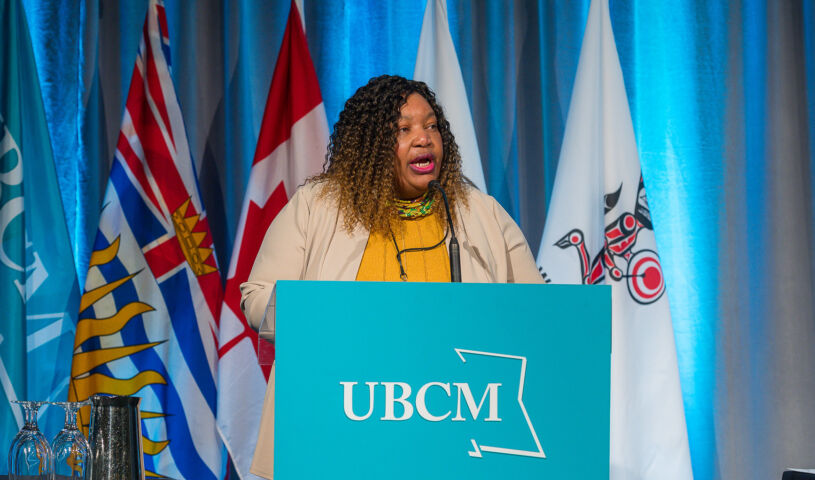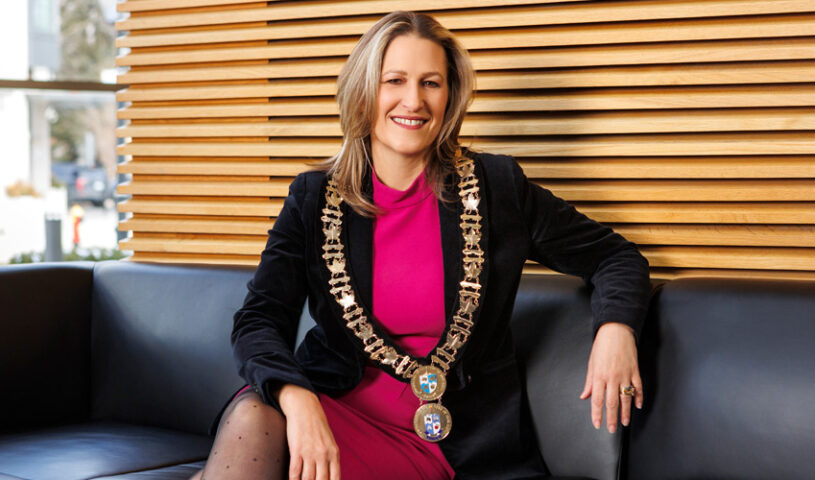UBCM Housing summit: Affordable housing, infrastructure top of mind for delegates
 Union of BC Municipalities President Trish Mandewo addresses delegates at the organization’s annual housing summit, held Feb. 13-14, in Vancouver. Photo: Union of BC Municipalities Flickr
Union of BC Municipalities President Trish Mandewo addresses delegates at the organization’s annual housing summit, held Feb. 13-14, in Vancouver. Photo: Union of BC Municipalities Flickr
The Union of BC Municipalities (UBCM) held its annual housing summit in Vancouver on Feb. 13-14 where municipal leaders from across the province discussed solutions to British Columbia’s growing housing affordability crisis.
Delegates also focused on the effects of recent provincial legislation that has brought changes to B.C.’s housing system.
“After years of runaway increases in housing costs, many British Columbians wonder if there’s any hope of restoring housing affordability,” said UBCM’s President Trish Mandewo. “The situation is dire, but I am hopeful things are beginning to improve.” Mandewo added that each order of government has tools and powers to restoring affordable and attainable housing in the province.
Curbing Speculation
Earlier this month, the B.C. government unveiled a new house flipping tax in this year’s proposed budget aimed at discouraging short-term holding of property for profit. If approved by the provincial legislature, all homes sold on or after Jan. 1, 2025 would be subject to the tax if they are sold less than two years after they were originally purchased.
B.C. Finance Minister Katrine Conroy said the tax is one of the province’s latest tools to curb speculation in the housing market.
“Prices went up as governments stepped back and speculators moved in,” Conroy said in a speech presenting the budget in the legislature. “That’s why we’re bringing in a home-flipping tax as our latest measure to crack down on bad actors.”
The tax rate will be highest for those who owned properties for the shortest period and will decline the longer the property is owned. The rate will be 20 percent for income earned from properties sold within 365 days of purchase, around 10 per cent after owning the property for a year and a half. The tax will be lifted after two years of ownership.
The government’s proposed budget forecasts that the tax would add $44 million to provincial revenue in the 2025-26 fiscal year.
Vacancy Rates, Price Controls
In January, the Canadian Mortgage and Housing Cooperation released its latest report on rental vacancy rates across Canada. British Columbia’s major urban centres – Vancouver and Victora – were among the cities with the lowest vacancy rates and highest rental costs. The growing unaffordability was reflected in data from the province’s smaller cities as well. Data from October 2023 shows that Kelowna had a vacancy rate of just 1.3 per cent.
The rate of increasing rental costs has led some municipal officials to call on the provincial government to implement vacancy controls to regulate the amount of rent landlords can charge on vacant properties.
In Nanaimo, Coun. Hilary Eastmure has called for vacancy controls, saying it is “absurd” that landlords can increase prices as much as they want between tenants.
While B.C. regulates how much landlords can increase rent for existing tenants, there is no limit on how much they can charge for a vacant unit, and that’s leading to a growing disparity between rent paid by existing and new tenants.
Bill 45 and Homelessness
Another issue that came up at the summit was the provincial government’s proposals to address homelessness.
Last year, the government proposed Bill 45 which was aimed at managing homeless encampments. The bill outlined that local government’s trying to remove an encampment would need to provide people with “reasonably available” alternative shelter before doing so.
That shelter would have to be a place they could spend the night, have access to a bathroom, and be offered at least one meal a day.
Homelessness in B.C. has become a growing problem for many communities. In Greater Vancouver alone, more than 4,800 people were homeless in 2023, sleeping in shelters, cars, or outdoors. That represents a 32 per cent increase compared to 2020.
“Those looking for a home are faced with limited choices and massive cost increases, and communities across the province are facing an increasing number of citizens with no home at all,” Mandewo said.
However, the amendment was later shelved after responses from critics who said it ignores the barriers that make many shelters inaccessible to people in encampments. In addition, critics pointed out that many communities in the province are unlikely to have adequate shelter space to accommodate everyone experiencing homelessness.
UBCM asked the province to withdraw Bill 45 in November, arguing it would leave local governments with one less tool to manage encampments.
“It is highly unlikely that any community in B.C. has sufficient shelter space for all unhoused persons, so there is reason to believe that it would be practically impossible for local governments seeking an injunction to meet this test,” a statement from UBCM said.
At the summit, Kelowna Mayor Tom Dyas said communities needed more support to provide long longer-term care and housing for unhoused people.
“In Kelowna, we have been a willing partner (for homeless housing),” he said. “We continue to ask for more shelter spaces, complex care, supportive housing and affordable housing options.”
Aging Infrastructure
Municipal leaders also called for more federal and provincial support to ensure infrastructure can meet growing demand. Delegates heard how changes to the framework for housing development and a growing provincial population will require rapid upgrading of community infrastructure throughout the province.
“We can all want to have the great goal of building all these homes, but all this infrastructure must come with it,” said Burnaby Mayor Mike Hurley.
That was a sentiment shared by other municipal officials at the summit who said they need funding to improve aging infrastructure.
“We have water and sewer [infrastructure] that needs to be renewed, that’s 50-plus years old, that was built for a very short design life,” said Langley Mayor Nathan Pachal. “We’re going to need a generational response from the federal government, working with the provincial government and local governments to deliver permanent infrastructure funding.”
How communities will pay for infrastructure renewal, while also taking on an increasing role in financially supporting attainable housing, are key questions motivating efforts to review the province’s local government finance system.
“Metro Vancouver is going to spend $20 billion over the next 15 years on wastewater treatment plants,” Hurley said. “Who’s going to pay for that? The federal government, so far, has said no.”
Strengthen Local Finances
Squamish Mayor Armand Hurford noted how allowing multiple small-scale homes on a single-family lot may trigger upgrades to entire streets and neighbourhoods. In November, the province introduced aimed at building more small-scale multi-home developments in areas previously zoned for single-family housing.
However, some fear that without adequate planning, new developments could further strain municipal infrastructure.
“A small development like a fourplex in just the wrong spot might trigger the need for massive infrastructure investment to facilitate that,” Hurford said.
In 2022, UBCM signed a memorandum of understanding with the Minister of Finance and the Minister of Municipal Affairs that committed the province and UBCM to work together to identify ways to strengthen the local government finances through a Local Government Finance Review Working Group.
“We need a stable and reliable funding-source for infrastructure upgrades,” Hurford added.
last summer, the province and UBCM agreed on a problem statement that noted local governments were reporting “difficulty raising enough revenue from property taxes, particularly regarding infrastructure capital costs and select service delivery costs.” MW
✯ Municipal World Executive and Essentials Plus Members: You might also be interested in Charles-Albert Ramsay’s article: Forward cities matter: Why Jane Jacobs’ economics is useful today.
Ibrahim Daair is Staff Writer at Municipal World.
Related resource materials:
- Small towns are feeling the cost of Canada’s housing crisis
- Owners struggle to sell short-term rentals as B.C. sets new rules
- Social housing waitlists growing across Canada’s big cities


